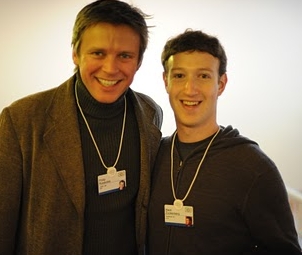Of course this was a prank; happy April Fool’s Day, and my apologies to everybody! 🙂 — Gwyn
Aye, well, I admit defeat, and I should have been paying more attention lately to what was going on at the edge of Second Life®. The announcement on the Second Life Community Blogs from Ebbe ‘Linden’ Altberg, specifically targeted to the SL resident population, was a complete surprise to me, but it shouldn’t have been:
Today I am pleased to announce that we have successfully established the terms of acquisition of Linden Lab by Facebook. Mark and I will closely work together towards improving our virtual world technology together and enabling millions of Facebook users to experiment immersion in an amazing environment using Oculus Rift, with the help of Philip Rosedale’s High Fidelity company, of which Linden Lab has been an investor. […] Together, the four companies — Facebook, Oculus VR, and now Linden Lab and High Fidelity — will bring immersive virtual environments to users, where they will be able to forge closer relationships, work together, engage in collaborative building, and produce and acquire virtual goods, at a global scale. We are very happy to bring our dreams into this next stage, and very grateful to Facebook’s CEO, Mark Zuckerberg, for sharing the same vision.
[…] Following Facebook’s trend in their acquisitions, it is unlikely that the names “Linden Lab” or “High Fidelity” will disappear, and “Second Life” will remain as an independent Facebook brand with its own identity. For you, faithful Second Life users, who have supported our own efforts for over a decade, this acquisition will not change what you have already been doing for so many years. You should, however, expect big changes and improvements on the viewer and overall performance of the grid. By closely working together with the team at Oculus VR and High Fidelity, as well as with Facebook’s Cory Ondrejka — Linden Lab’s former CTO — we expect to being unsurpassable quality and realism to the immersive experience of Second Life, to a level we could have never achieve on our own. […]
There is more in that line, but I leave the rest for you to read on your own; the press release is a bit different, as it addresses a different market.
We should have seen this coming. High Fidelity’s “secret ops” were misleading — we had no clear idea what Philip was doing, except wasting funding money, but we all predicted that either High Fidelity would provide a migration plan for Second Life’s content, or any “new” virtual world would be doomed to disappear — like Blue Mars, Cloud Party, and so forth. At this stage, it’s highly unlikely that any “new” virtual world would have a chance to beat Linden Lab at their own game. Philip’s company, from the very start, had Linden Lab as its investor, and even though Philip resigned from LL’s board, it was a bit unlikely that the Lab was unaware of Philip’s plans, or that Philip was completely “out of the loop” from the company he still owned. Clearly the whole setup was a convenient façade for Philip to be able to develop a “second generation virtual world”, free from the constraints of Second Life, and making sure none of SL’s users got anxious about what would happen with their beloved virtual world. But the recent announcements by HF looked seriously like Philip was waving the “Buy me!” flag, loud and clear, and Zuckerberg’s knowledge of Philip’s involvement both in LL and HF, as well as his former relationship with Cory, caught his attention.
Linden Lab, on their side, has been toying with Facebook integration and, lately, with a way to put Second Life on a tablet. Speculation about a possible sale to Facebook is not new. The choice of a new CEO who has expert know-how about social environments should have provided a more smooth transition path (Zuckerberg and Altberg speak the same language of social media). It’s also interesting to note that the change of CEO at Linden Lab was so shortly before this announcement; it looks to me now as if Facebook had been in touch with Linden Lab before, but saw Rod Humble’s “creative gaming” vision incompatible with their own. Linden Lab replied by exchanging CEOs for someone who knows what social media is about, and re-cast their product — Second Life — as the next.-generation social hub, one that uses immersion in 3D environments. This was probably what Zuckerberg wanted to hear to make his bid. And although we all know that Zuckerberg might have despised Second Life in the past (we remember the drama about cancelling SL avatar accounts, like my own) but that was while he was still drooling over Zynga. As Zynga’s revenues stagnated and started to diminish, it was clear he needed a completely different kind of environment to capture his users’ attention.
The Oculus gang is another story. I would have expected that they’d recommend Zuckerberg to buy Valve instead. This might still be the case, but Zuckerberg is after social engagement, revenues from virtual goods (and sure, why not, also from ads), and users who are familiar with social relationships in the “new” stage of immersive social media. Valve is essentially a game tech company — one that has a wonderful business culture, but probably too alien to Facebook. In fact, thanks to Zuckerberg’s experience with Zynga (good and bad), he already knows how to get people to play games and pay for them — he already has a game distribution platform (Facebook!), he doesn’t need another one. Also, Valve’s users are “fragmented” — they play immersive 3D games, yes, but these are not connected between each other. Zynga attempted a 2D “connection” with their games, and that was how their games became initially so popular, but we all know that the novelty didn’t last. By contrast, Second Life’s “novelty value” has lasted a whole decade and more. So, at this juncture, Oculus VR just provides hype around a Facebook-branded gadget (or at least “Facebook-blessed”) which will drive people to test it out, even not fully knowing what they should do with it. Zuckerberg just suggests that social-savvy Facebook users should experiment with social-rich virtual world environments — like Second Life.
I mean, all this should have been obvious!

And consider the list of events:
Linden Lab had been toying with “Facebook integration” for several years now.
Ebbe Altberg’s profile shows clearly his background in social media, from his Yahoo times. We all commented that Linden Lab’s focus on Second Life would become more “social-oriented” and generally that was viewed as a good idea. But Ebbe hasn’t released any details. He has remained silent about his long-term strategy, while still showing up pretty much everywhere, from forums to in-world interviews and conferences.
Facebook buys Oculus VR, as reported pretty much everywhere. The gaming world hiccups, trying to figure out what Zuckerberg was thinking about. The acquisition of WhatsApp was obvious (getting hundreds of millions of users for a relatively cheap price), but Oculus Rift is just hype (and thousands of happy “beta-testers”), a technology still looking for a killer application (obviously the gaming industry is happily developing all sorts of Rift-compatible games, in the hope that they become the killer application for the Rift. But suddenly all was questioned. With the new Oculus owner being Facebook, what would that mean for the Rift? Zuckerberg’s answer: immersive virtual worlds.
Wired features an article saying that the future of Facebook will be to do something like Second Life. Gamasutra’s Nick Harris, however, goes further than that and had already suggested that Facebook should simply buy Linden Lab. The SL resident community had mixed feelings about that, some claiming that the SL technology was not up to the latest standards (too cumbersome, no mobile app, no Web app) and thus Facebook wouldn’t have an interest in it. Well, history proved us all wrong: High Fidelity has the tech, Second Life has the user-base, the economy, the content, and the working business model. All that Zuckerberg needed to do was to grab both and put Cory Ondrejka in charge.
There were hints all over the place. A few days ago, Zuckerberg, after being asked what he was going to do with the Oculus Rift, since Facebook is not a hardware company, replied:
We’re not going to try to make a profit off of the hardware long-term… but if we can make this a network where people are communicating, and buying virtual goods, and there might be ads down the line… that’s where the business could come from.
That pretty much sounds like a description of the only virtual world platform still in operation, namely, Second Life. We should have spotted that immediately.
Why the sudden change towards virtual worlds? Well, perhaps it’s just because Zuckerberg’s a geek at the core. Or perhaps because he has successfully “stolen” so many employees from Linden Lab. Cory, of course, is the better-known example, but, as Hamlet Au pointed out, ex-Babbage Linden (Jim Purbrick) and Ian Wilkes, among others. Maybe he has been hanging around them for a long time and has seen how money can be made inside immersive virtual worlds. Maybe the ex-Lindens have persuaded Zuckerberg to bring them all over — both the teams at Linden Lab and the teams at High Fidelity. Maybe. We can only speculate. But that’s the trouble with companies with a geek culture — they tend to band geeks together.

Then Philip Rosedale’s High Fidelity starts putting out news all over the place, saying how they had successfully raised more funding, and Philip even hinted that a third round of funding was on the horizon. He put up a huge sign pointing to him saying “Buy me!” and it was more than obvious who he had in mind. Philip Rosedale and Mark Zuckerberg had certainly planned all this for a long while.
P. G. Wodehouse has a wonderful expression which I love: “concatenation of circumstances”. It certainly applies to this case. Zuckerberg, possibly reaching the limits with what Facebook can do and offer (a third of the world’s population with a device connected to the Internet is a Facebook user; it’s hard to grow beyond that), is looking for new things to focus on, while, at the same time, trying to get his investors happy (thus the deal with WhatsApp). But because Facebook is already a filthy rich operation, he can afford to “go Google” — by this I mean the uncanny ability that Google has to spread themselves thin with gazillions of projects, almost none of them working out (in terms of developing a sustainable business model), but not affecting Google’s financial solidity in the least.
Maybe Zuckerberg, after a decade or so, is planning to do exactly the same: start throwing excess money into things that sound cool, that baffle the media with unexpected twists, to try to make those ideas work (in terms of generating revenue), and assembling things together from different sources, patching the Facebook brand (or at least “blessing”) on top of it, and dazzle the world.
This certainly looks like the case. Somehow Zuckerberg opened his eyes and saw that there is money to be made with virtual goods, so long as you create a social environment for those goods to have a purpose. Second Life demonstrates this perfectly. But Second Life’s tech is lagging behind and losing appeal. The next-generation virtual world, with exactly the same characteristics as Second Life, but with a 21st-century appeal, is yet to be done. Linden Lab doesn’t control the hardware that can enable that, and their software is “stuck”. Oculus VR doesn’t have the software, nor the users (in fact, all they have is hype and two generations of good prototypes). High Fidelity just has the brand, new, shiny software that allows all that — but has no users, no content, no social environment. Facebook has a billion of socially-engaged users (who, however, are not so eager to shell out money) and the money and the means to put all together. A marriage of the four — while each retains its own corporate identity and individuality — doesn’t sound so “alien” when seeing through that light.
What this means is that in a couple of years or so (I wouldn’t expect it to be earlier than that), we will have a ultimate-generation immersive virtual marketplace for social interaction, under the FB/SL/HF/Rift umbrella — one that will also allow non-Rift users to join, of course. It will start with a few millions of (current SL) users but probably aim to for the mainstream. Exactly how Zuckerberg wishes to do that is still unknown. Gamers having bought the Rift will expect the “new” immersive world to have latest-generation games, or else they will completely ignore Facebook’s vision, and that’s another story — how will game companies develop for this “new” environment? It’s definitely going to require much closer “integration” than, say, Facebook games (which can run on completely separate environments and just connect to Facebook via a simple API). We all know that it’s impossible to develop Triple-A games in Second Life, but maybe the (yet unknown) aspects of High Fidelity will allow that to be possible. But first Zuckerberg — or, more likely, Cory and Babbage, working with Philip and the developers still at Linden Lab — will need to figure out how to bring all the amazing content from Second Life into this “new” environment, and that will be a very hard task to accomplish.
Some critics wonder about what will happen with OpenSimulator, in the wake of this announcement, and fear that Zuckerberg will start suing all OpenSimulator-based grids. I don’t think that will be the case. Instead, the “New Second Life” will be so amazingly different from the current SL/OpenSimulator — even though it will have the same content — that OpenSimulator will not be a “threat” to Zuckerberg. Or, in a more impressive demonstration of Zuckerberg’s “over-reaching assimilation”, he might even provide OpenSimulator grids with the same kind of APIs and SDKs and whatnot that he might offer to game development companies — effectively allowing “external” grids to “merge” into the Facebook Metaverse (i.e. giving them the ability to get their content also visible through the future HF viewers, as long as they agree to abide to some kind of Facebook ToS), something we all hoped that would happen with Second Life and existing OpenSimulator girds, but quickly figured out that it would never become reality. Zuckerberg might now prefer to have as many allies as possible, instead of shutting eventual “small fry” out of his new vision.
Seriously, I wouldn’t like to be in Google’s shoes at this time. They blew their chance with Lively, and who knows what Google Glasses might actually mean for Google. Apple, of course, ignores all that — they never believed in a marketplace for virtual goods, unless these are music and videos, which they already sell. But apparently even Apple might have plans of their own.
Still, the lesson here is that you cannot create a successful business venture with a virtual goods marketplace merely because you have a nice gadget to provide immersion. Zuckerberg learned that very quickly: you need people, a culture, a social environment. That’s what he’s good at creating. Apple sucks at that, and so does Microsoft, and, while Google is supposed to have learned their lesson (with the failure of Lively, Buzz, Orkut, Google Groups, and merging everything into Google Plus before it’s too late), it’s still unknown if they will ever find their way back. But I think that all these companies will wait first to see what Facebook is going to achieve — maybe this will be Facebook’s biggest flops ever, and watching what the stock market says will be interesting. Microsoft and Google can make as many mistakes as they like without affecting their share value. Will Facebook be able to do the same? We will see. Will Facebook succeed in creating an immersive virtual environment — the 3D world-wide web — as we have been promised a decade ago? Maybe — I remain a bit skeptic about how this isn’t really a mainstream technology. The truth is, if someone can pull it off, at least for a few years, it’s the combination of Facebook, Linden Lab, High Fidelity, and Oculus VR, all working towards the same goal.





